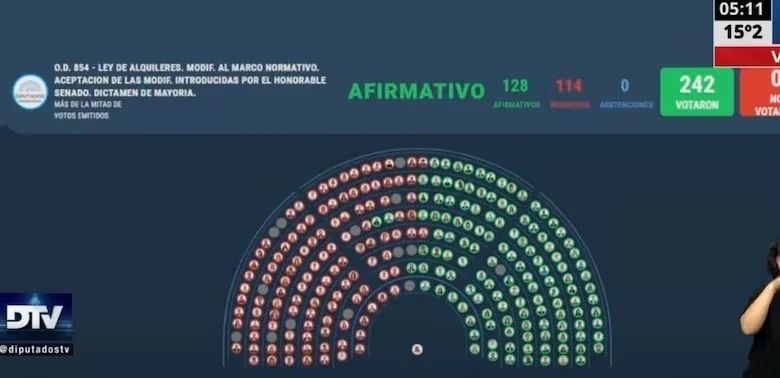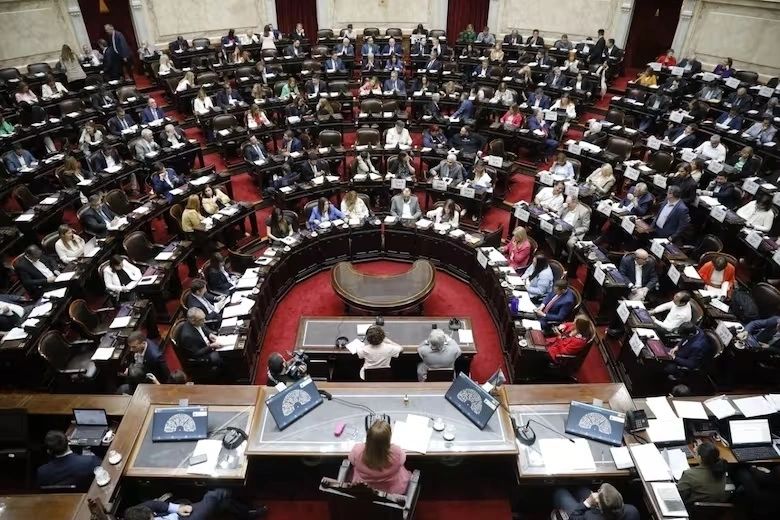BuySellBA
Administrator
New Rental Law: What it says, when it comes into effect and what the index that will update the contracts hides - La Nación Propiedades

Source:

 www.lanacion.com.ar
www.lanacion.com.ar
October, 14 2023.
Deputies approved changes to a new rental law promoted by the officialism, it has now been submitted to the Executive Branch and for it to come into effect it must be published in the Official Gazette.
 Modificar imagen
Modificar imagen
After more than two years of debates and projects, the rental law passed in 2020 will have changes but its modifications are not substantial to improve the current market situation.
After 5 in the morning, Deputies approved a new rental law. Now, the approved reform was submitted to the Executive Branch and for it to formally come into effect it must be published in the Official Gazette. But until it comes into force, the contracts will continue under the law enacted in July 2020, being three years and adjusted annually through the Lease Contract Index (ICL).
The changes to the new rule were promoted by 128 votes in favor and 114 against. The deputies from the Frente de Todos, two deputies from the Federal Interblock, one from Juntos por Río Negro and four from the Left supported the changes. On the other hand, the deputies of Javier Milei (La Libertad Avanza), Juntos Por el Cambio and some provincial legislators opposed the modifications that the officialism had introduced in the Senate. “Blind ideology prevailed over reason. The reforms introduced by the Senate in the Rental Law were approved by the Deputies. This reform will further reduce the supply of rental housing properties, harming tenants, owners and real estate agents. It does not provide any solution to the current situation,” says Enrique Abatti, president of the Chamber of Owners.
The Lower House thus validated the text with the changes that Kirchnerism imposed in the Senate last week. The officialism insisted on maintaining the three-year contracts but with semiannual increases and adjusted to the Casa Propia index, based on the lowest indicator between the average salary variation of the last year and the average inflation of the same period. That is to say, the only two changes introduced to the 2020 law are that the adjustment is reduced from one year to six months and the index to be taken is no longer the ICL of the Central Bank but that of Casa Propia .
But the most relevant thing is the indexation by the Casa Propia coefficient, developed by the Ministry of Territorial Development and Habitat. The index takes into account the lowest indicator between the average salary variation of the last year and the average inflation of the same period.
Specialists point out that adjusting the rental value every six months based on the Casa Propia coefficient does not imply an improvement in rent but rather would be maintained in the same way as the annual update based on the Rental Contract Index (ICL) now does. That is to say, it would not produce a substantial improvement in supply, which is one of the underlying problems of the market.
 Modificar imagen
Modificar imagen
The index takes into account the lowest indicator between the average salary variation of the last year and the average inflation of the same period. “In this sense, the formula accompanies the will of the National Government to reach a horizon where salary growth accompanies the dream of Homeownership,” says a Government document that explains the coefficient.
In addition, other changes that are introduced to the law according to the approved project:
That is to say, although the semiannual update sounds better for the owner than an annual update, the numbers say otherwise: “Adjusting every six months for Own Home yields the same as annually for the ICL,” says an economist specialized in housing matters. , Federico González Rouco. “The current way of updating and the one proposed by the new law approved this morning generates a loss for the owner equivalent to approximately nine months of rent in the period that a contract lasts: three years,” he summarizes, and clarifies that this calculation is made based on the first three years of validity of the rental law.
 Modificar imagen
Modificar imagen
Yesterday's session of deputies had as the last item on the agenda the modification of the rental law that was approved at 5 in the morning
The rental value of a studio apartment in CABA is $155,426 per month, a 1-bedroom apartment reaches $198,873 per month and a 2-bedroom, 70 m² unit is rented for $260,984 per month.
Currently, Nuñez is positioned as the most expensive neighborhood in the City of Buenos Aires with an average price of $270,728 per month. Coghlan and Palermo follow with $260,689 and $260,146 pesos per month, respectively.
Regarding supply, the number of used studio to 3-bedroom apartments available for rent that were published on property search engines in August was only 448 units, according to Real Estate Report. This represents a 35% drop from the previous month and 69% year-on-year.
Germán Gómez Picasso, director of Real Estate Report, points out that these average values are only part of the story. “The reality is that, beyond the averages of published offers for standard units, if you are looking for a unit in good condition, the values far exceed these averages,” he highlights.
In northern Greater Buenos Aires, Zonaprop recorded that the increase in rents was 16.3% in the month of August, while the total number of notices continues to fall, reaching historical levels. So far in 2023, the price has risen 99.4%, above inflation. The average rental price for a two-bedroom apartment is $173,890 per month. A 3 bedroom apartment reaches 224,337 pesos per month.
The towns of Olivos and Vicente López are those with the most expensive offer in the north with a value of $256,443 and $233,381 per month, respectively.
In the west-south zone, prices rose 14.2% in August and have accumulated an increase of 94.3% so far this year, above inflation. On a year-on-year basis, this number is 143.6%. Renting a 1-bedroom, 50 m² apartment costs $122,339 per month, while a 2-bedroom, 70 m² apartment is rented for 154,666 pesos per month.
The town of Canning leads the price ranking with a value of $162,644 per month. They are followed by Wilde ($159,613 per month) and Castelar ($146,470 per month).
In October of last year, the average rent for a two-bedroom apartment in the city of Buenos Aires was $83,355, according to Zonaprop in a context in which year-on-year inflation was around 88%.
Tenants who suffer the annual adjustment of the rental contract price this October will pay more than double the current amount. Without anesthesia, contracts will increase between 115.33% and 116% in the first two weeks of the month according to the Rental Contract Index (ICL) that governs the 2020 law. That is, whoever signed a contract under current law a year ago and paid $83,335 per month for one year and you must update now, the next 12 months you will pay $179,442.
But the greatest concern is raised by the estimates that indicate for those who must adjust their contracts on October 31, the update percentages will rise to 120%.
www.buysellba.com

Source:

Nueva ley de alquileres: qué dice, cuándo entra en vigencia y qué esconde el índice que actualizará los contratos
Diputados aprobó cambios para una nueva ley de alquileres impulsada por el oficialismo, ahora fue elevada al Poder Ejecutivo y para que entre en vigencia deberá ser publicada en el Boletín Oficial.
October, 14 2023.
Deputies approved changes to a new rental law promoted by the officialism, it has now been submitted to the Executive Branch and for it to come into effect it must be published in the Official Gazette.

After more than two years of debates and projects, the rental law passed in 2020 will have changes but its modifications are not substantial to improve the current market situation.
After 5 in the morning, Deputies approved a new rental law. Now, the approved reform was submitted to the Executive Branch and for it to formally come into effect it must be published in the Official Gazette. But until it comes into force, the contracts will continue under the law enacted in July 2020, being three years and adjusted annually through the Lease Contract Index (ICL).
The changes to the new rule were promoted by 128 votes in favor and 114 against. The deputies from the Frente de Todos, two deputies from the Federal Interblock, one from Juntos por Río Negro and four from the Left supported the changes. On the other hand, the deputies of Javier Milei (La Libertad Avanza), Juntos Por el Cambio and some provincial legislators opposed the modifications that the officialism had introduced in the Senate. “Blind ideology prevailed over reason. The reforms introduced by the Senate in the Rental Law were approved by the Deputies. This reform will further reduce the supply of rental housing properties, harming tenants, owners and real estate agents. It does not provide any solution to the current situation,” says Enrique Abatti, president of the Chamber of Owners.
The Lower House thus validated the text with the changes that Kirchnerism imposed in the Senate last week. The officialism insisted on maintaining the three-year contracts but with semiannual increases and adjusted to the Casa Propia index, based on the lowest indicator between the average salary variation of the last year and the average inflation of the same period. That is to say, the only two changes introduced to the 2020 law are that the adjustment is reduced from one year to six months and the index to be taken is no longer the ICL of the Central Bank but that of Casa Propia .
But the most relevant thing is the indexation by the Casa Propia coefficient, developed by the Ministry of Territorial Development and Habitat. The index takes into account the lowest indicator between the average salary variation of the last year and the average inflation of the same period.
Specialists point out that adjusting the rental value every six months based on the Casa Propia coefficient does not imply an improvement in rent but rather would be maintained in the same way as the annual update based on the Rental Contract Index (ICL) now does. That is to say, it would not produce a substantial improvement in supply, which is one of the underlying problems of the market.
Therefore, the changes would be almost imperceptible because the duration of the contracts would continue to be three years (until 2020 it was two years), the update by the ICL once a year or by the Casa Propia coefficient every six months would give a result similar.

The Chamber of Deputies approved the modifications introduced in the Senate to the Rental Law.
What is the new adjustment index that replaces the current one about?
The coefficient developed by the Ministry of Territorial Development and Habitat was published for the first time in November 2021 and is the one used today for the Casa Propia and Procrear II Credits.The index takes into account the lowest indicator between the average salary variation of the last year and the average inflation of the same period. “In this sense, the formula accompanies the will of the National Government to reach a horizon where salary growth accompanies the dream of Homeownership,” says a Government document that explains the coefficient.
In addition, other changes that are introduced to the law according to the approved project:
- Owners will not be able to request payment of months in advance from the tenant.
- The requirement that rental advertisements be made in national currency (pesos).
- Owners will be exempt from paying Personal Property for the properties they use for rent.
- Exemption from paying the monotax for income from the rental of up to two properties.
- The possibility for both parties to deduct 10% of the annual amount of the rental contract from Income Tax.
- They will not pay the tax on the check in the bank accounts intended to collect those contracts that are duly registered with the AFIP.
- The obligation to register contracts with the AFIP is maintained, in accordance with the provisions of current law.
That is to say, although the semiannual update sounds better for the owner than an annual update, the numbers say otherwise: “Adjusting every six months for Own Home yields the same as annually for the ICL,” says an economist specialized in housing matters. , Federico González Rouco. “The current way of updating and the one proposed by the new law approved this morning generates a loss for the owner equivalent to approximately nine months of rent in the period that a contract lasts: three years,” he summarizes, and clarifies that this calculation is made based on the first three years of validity of the rental law.

Yesterday's session of deputies had as the last item on the agenda the modification of the rental law that was approved at 5 in the morning
Current market situation prices and supply
Unit rents in CABA experienced an increase of 12.8% in August, according to the latest Zonaprop report. For the fourth consecutive month, it marks a record monthly increase since the beginning of the series (2016). So far this year, rental prices have accelerated and accumulated 114%.The rental value of a studio apartment in CABA is $155,426 per month, a 1-bedroom apartment reaches $198,873 per month and a 2-bedroom, 70 m² unit is rented for $260,984 per month.
Currently, Nuñez is positioned as the most expensive neighborhood in the City of Buenos Aires with an average price of $270,728 per month. Coghlan and Palermo follow with $260,689 and $260,146 pesos per month, respectively.
Regarding supply, the number of used studio to 3-bedroom apartments available for rent that were published on property search engines in August was only 448 units, according to Real Estate Report. This represents a 35% drop from the previous month and 69% year-on-year.
Germán Gómez Picasso, director of Real Estate Report, points out that these average values are only part of the story. “The reality is that, beyond the averages of published offers for standard units, if you are looking for a unit in good condition, the values far exceed these averages,” he highlights.
In northern Greater Buenos Aires, Zonaprop recorded that the increase in rents was 16.3% in the month of August, while the total number of notices continues to fall, reaching historical levels. So far in 2023, the price has risen 99.4%, above inflation. The average rental price for a two-bedroom apartment is $173,890 per month. A 3 bedroom apartment reaches 224,337 pesos per month.
The towns of Olivos and Vicente López are those with the most expensive offer in the north with a value of $256,443 and $233,381 per month, respectively.
In the west-south zone, prices rose 14.2% in August and have accumulated an increase of 94.3% so far this year, above inflation. On a year-on-year basis, this number is 143.6%. Renting a 1-bedroom, 50 m² apartment costs $122,339 per month, while a 2-bedroom, 70 m² apartment is rented for 154,666 pesos per month.
The town of Canning leads the price ranking with a value of $162,644 per month. They are followed by Wilde ($159,613 per month) and Castelar ($146,470 per month).
The update for contracts that are renewed in October under the current law
In October of last year, the average rent for a two-bedroom apartment in the city of Buenos Aires was $83,355, according to Zonaprop in a context in which year-on-year inflation was around 88%.
Tenants who suffer the annual adjustment of the rental contract price this October will pay more than double the current amount. Without anesthesia, contracts will increase between 115.33% and 116% in the first two weeks of the month according to the Rental Contract Index (ICL) that governs the 2020 law. That is, whoever signed a contract under current law a year ago and paid $83,335 per month for one year and you must update now, the next 12 months you will pay $179,442.
But the greatest concern is raised by the estimates that indicate for those who must adjust their contracts on October 31, the update percentages will rise to 120%.
www.buysellba.com

